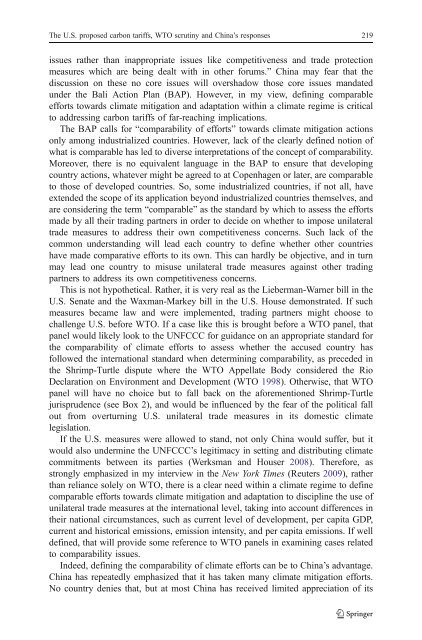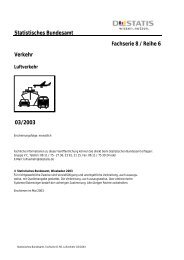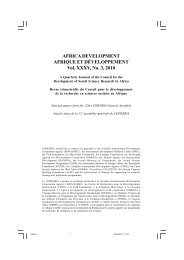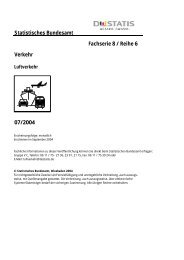The international economics of resources and resource ... - Index of
The international economics of resources and resource ... - Index of
The international economics of resources and resource ... - Index of
Create successful ePaper yourself
Turn your PDF publications into a flip-book with our unique Google optimized e-Paper software.
<strong>The</strong> U.S. proposed carbon tariffs, WTO scrutiny <strong>and</strong> China’s responses 219<br />
issues rather than inappropriate issues like competitiveness <strong>and</strong> trade protection<br />
measures which are being dealt with in other forums.” China may fear that the<br />
discussion on these no core issues will overshadow those core issues m<strong>and</strong>ated<br />
under the Bali Action Plan (BAP). However, in my view, defining comparable<br />
efforts towards climate mitigation <strong>and</strong> adaptation within a climate regime is critical<br />
to addressing carbon tariffs <strong>of</strong> far-reaching implications.<br />
<strong>The</strong> BAP calls for “comparability <strong>of</strong> efforts” towards climate mitigation actions<br />
only among industrialized countries. However, lack <strong>of</strong> the clearly defined notion <strong>of</strong><br />
what is comparable has led to diverse interpretations <strong>of</strong> the concept <strong>of</strong> comparability.<br />
Moreover, there is no equivalent language in the BAP to ensure that developing<br />
country actions, whatever might be agreed to at Copenhagen or later, are comparable<br />
to those <strong>of</strong> developed countries. So, some industrialized countries, if not all, have<br />
extended the scope <strong>of</strong> its application beyond industrialized countries themselves, <strong>and</strong><br />
are considering the term “comparable” as the st<strong>and</strong>ard by which to assess the efforts<br />
made by all their trading partners in order to decide on whether to impose unilateral<br />
trade measures to address their own competitiveness concerns. Such lack <strong>of</strong> the<br />
common underst<strong>and</strong>ing will lead each country to define whether other countries<br />
have made comparative efforts to its own. This can hardly be objective, <strong>and</strong> in turn<br />
may lead one country to misuse unilateral trade measures against other trading<br />
partners to address its own competitiveness concerns.<br />
This is not hypothetical. Rather, it is very real as the Lieberman-Warner bill in the<br />
U.S. Senate <strong>and</strong> the Waxman-Markey bill in the U.S. House demonstrated. If such<br />
measures became law <strong>and</strong> were implemented, trading partners might choose to<br />
challenge U.S. before WTO. If a case like this is brought before a WTO panel, that<br />
panel would likely look to the UNFCCC for guidance on an appropriate st<strong>and</strong>ard for<br />
the comparability <strong>of</strong> climate efforts to assess whether the accused country has<br />
followed the <strong>international</strong> st<strong>and</strong>ard when determining comparability, as preceded in<br />
the Shrimp-Turtle dispute where the WTO Appellate Body considered the Rio<br />
Declaration on Environment <strong>and</strong> Development (WTO 1998). Otherwise, that WTO<br />
panel will have no choice but to fall back on the aforementioned Shrimp-Turtle<br />
jurisprudence (see Box 2), <strong>and</strong> would be influenced by the fear <strong>of</strong> the political fall<br />
out from overturning U.S. unilateral trade measures in its domestic climate<br />
legislation.<br />
If the U.S. measures were allowed to st<strong>and</strong>, not only China would suffer, but it<br />
would also undermine the UNFCCC’s legitimacy in setting <strong>and</strong> distributing climate<br />
commitments between its parties (Werksman <strong>and</strong> Houser 2008). <strong>The</strong>refore, as<br />
strongly emphasized in my interview in the New York Times (Reuters 2009), rather<br />
than reliance solely on WTO, there is a clear need within a climate regime to define<br />
comparable efforts towards climate mitigation <strong>and</strong> adaptation to discipline the use <strong>of</strong><br />
unilateral trade measures at the <strong>international</strong> level, taking into account differences in<br />
their national circumstances, such as current level <strong>of</strong> development, per capita GDP,<br />
current <strong>and</strong> historical emissions, emission intensity, <strong>and</strong> per capita emissions. If well<br />
defined, that will provide some reference to WTO panels in examining cases related<br />
to comparability issues.<br />
Indeed, defining the comparability <strong>of</strong> climate efforts can be to China’s advantage.<br />
China has repeatedly emphasized that it has taken many climate mitigation efforts.<br />
No country denies that, but at most China has received limited appreciation <strong>of</strong> its








